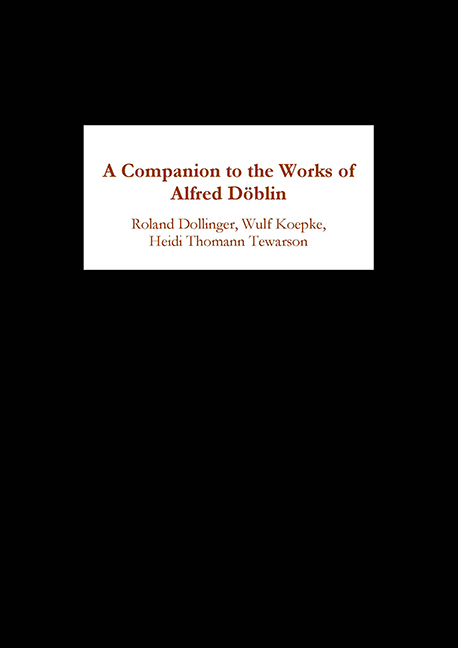Book contents
- Frontmatter
- Contents
- Foreword
- Abbreviations and Translations of Titles
- Works by Alfred Döblin
- Introduction
- Early Works
- Works of the Weimar Period
- The Fall of Wallenstein, or the Collapse of Narration? The Paradox of Epic Intensity in Döblin's Wallenstein
- Technology and Nature: From Döblin's Berge Meere und Giganten to a Philosophy of Nature
- “Arzt und Dichter”: Döblin's Medical, Psychiatric, and Psychoanalytical Work
- Döblin's Berlin: The Story of Franz Biberkopf
- Döblin's Engagement with the New Media: Film, Radio and Photography
- Döblin's Political Writings during the Weimar Republic
- Exile and Return to Europe
- Bibliography
- Notes on the Contributors
- Index
“Arzt und Dichter”: Döblin's Medical, Psychiatric, and Psychoanalytical Work
from Works of the Weimar Period
Published online by Cambridge University Press: 27 April 2017
- Frontmatter
- Contents
- Foreword
- Abbreviations and Translations of Titles
- Works by Alfred Döblin
- Introduction
- Early Works
- Works of the Weimar Period
- The Fall of Wallenstein, or the Collapse of Narration? The Paradox of Epic Intensity in Döblin's Wallenstein
- Technology and Nature: From Döblin's Berge Meere und Giganten to a Philosophy of Nature
- “Arzt und Dichter”: Döblin's Medical, Psychiatric, and Psychoanalytical Work
- Döblin's Berlin: The Story of Franz Biberkopf
- Döblin's Engagement with the New Media: Film, Radio and Photography
- Döblin's Political Writings during the Weimar Republic
- Exile and Return to Europe
- Bibliography
- Notes on the Contributors
- Index
Summary
The physician and the writer Döblin cannot be isolated from each other, although they are all too often studied as separate entities. Ironically, Döblin himself contributed to the perception that Döblin the doctor and Döblin the writer were two completely separate personae. In the newspaper article “Zwei Seelen in einer Brust” (Two Souls in one Body, 1928; SLW 103–6) the physician and the writer meet and comment on each other. Without even having met his counterpart, the physician complains that the writer's political opinions are unreliable, his books too difficult to read, and his imagination overly exuberant. The writer, on the other hand, seems more curious about the doctor, and visits him in his office in Berlin-Lichtenberg, “das merkwürdigste Milieu, das man sich denken kann” (105). But the meeting reveals that they are the exact counter parts of each other, and the writer cannot shake his increasing anxiety in the face of the doctor's “psychotherapeutischen Blick” (105). After all, he might be catching on to his psychological defects — unpleasant memories are slowly emerging. In the end the writer would prefer not to meet this “Anonymus” (106) again, to whom he was but a mere human being and ultimately just another patient. And the doctor assumes that the writer will probably make fun of him in his writing (which, of course, will not faze him, as he is quick to infer).
The intention behind this artificial separation is obviously satirical. Döblin contrasts the lone “grauer Soldat” of the working class with the narcissistic “Primadonna” (105) of the intellectual circles to depict the very different worlds he moves about in. More important, he describes two different modes of processing and representing reality, both of which are intrinsic to his writing: self-effacing analysis, psychological intuition, and shorthand descriptions on the one hand and lively fantasy, quick-witted irony, and an abundance of metaphors on the other. A closer look reveals how much these two modes have in common. The doctor and the writer find common ground in their research: the doctor loves reading the travel books that the writer uses in preparation for his works, while the writer researches the east of Berlin and writes about the people who are treated by the doctor.
- Type
- Chapter
- Information
- A Companion to the Works of Alfred Döblin , pp. 111 - 140Publisher: Boydell & BrewerPrint publication year: 2003



